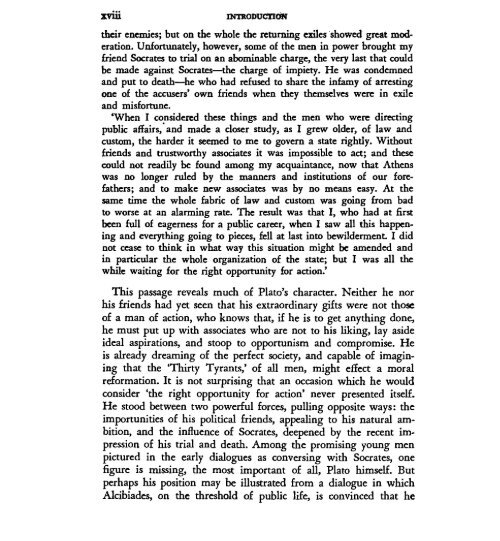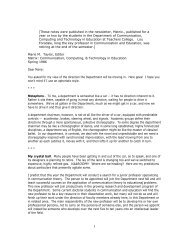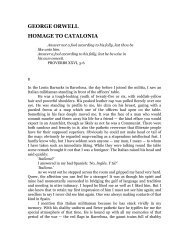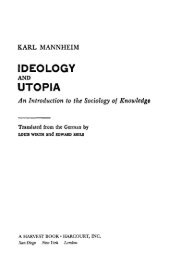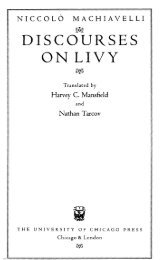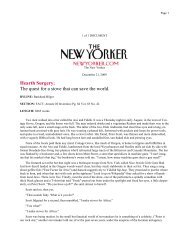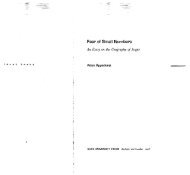THE REPUBLIC OF PLATO - Studyplace
THE REPUBLIC OF PLATO - Studyplace
THE REPUBLIC OF PLATO - Studyplace
You also want an ePaper? Increase the reach of your titles
YUMPU automatically turns print PDFs into web optimized ePapers that Google loves.
INTRODucndff<br />
their enemies; but on the whole the returning exiles showed great moderation.<br />
Unfortunatdy, however, some of the men in power brought my<br />
friend Socrates to trial on an abominable charge, the very last that could<br />
be made against Socrates-the charge of impiety. He was condemned<br />
and put to death-he who had refused to share the infamy of arresting<br />
one of the accusers' own friends when they themselves were in exile<br />
and misfortune.<br />
'When I considered these things and the men who were directing<br />
public affairs,' and made a closer study, as I grew older, of law and<br />
custom, the harder it seemed to me to govern a state rightly. Without<br />
friends and trustworthy associates it was impossible to act; and these<br />
could not readily be found among my acquaintance, now that Athens<br />
was no longer ruled by the manners and institutions of our forefathers;<br />
and to make new associates was by no means easy. At the<br />
same time the whole fabric of law and custom was going from bad<br />
to worse at an alarming rate. The result was that I, who had at first<br />
been full of eagerness for a public career, when I sawall this happening<br />
and everything going to pieces, fell at last into bewilderment. I did<br />
not cease to think in what way this situation might be amended and<br />
in particular the whole organization of the state; but I was all the<br />
while waiting for the right opportunity for action.'<br />
This passage reveals much of Plato's character. Neither he nor<br />
his friends had yet seen that his extraordinary gifts were not those<br />
of a man of action, who knows that, if he is to get anything done,<br />
he must put up with associates who are not to his liking, lay aside<br />
ideal aspirations, and stoop to opportunism and compromise. He<br />
is already dreaming of the perfect society, and capable of imagining<br />
that the 'Thirty Tyrants,' of all men, might effect a moral<br />
reformation. It is not surprising that an occasion which he would<br />
consider 'the right opportunity for action' never presented itself.<br />
He stood between two powerful forces, pulling opposite ways: the<br />
importunities of his political friends, appealing to his natural ambition,<br />
and the influence of Socrates, deepened by the recent impression<br />
of his trial and death. Among the promising young men<br />
pictured in the early dialogues as conversing with Socrates, one<br />
figure is missing, the most important of all, Plato himself. But<br />
perhaps his position may be illustrated from a dialogue in which<br />
Alcibiades, on the threshold of public life, is convinced that he


